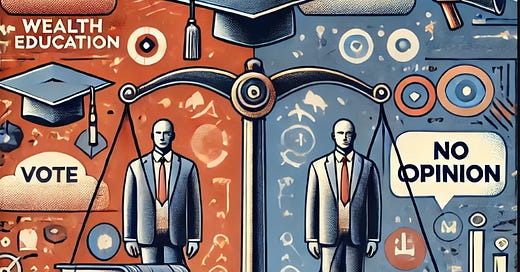The Economics of Political Engagement: Do Wealth and Education Shape Opinions?
Survey data reveal that higher income and education levels reduce political neutrality, increasing confidence in opinions on issues like free speech and the role of government in the economy.
The world is ablaze with political fervor. How do factors like wealth and education influence engagement in political thought and activity? An analysis of recent survey data reveals that both income and education influence political involvement, in terms of who participates and also how strongly people express their views.
Political Engagement as a “Luxury Activity”
Akin to Rob Henderson’s concept of Luxury Beliefs, which posits that ideas and opinions can serve to confer status on the wealthy, we were curious as to whether engagement in political activity served as a “luxury activity”. Is political engagement a status symbol?
According to data recently collected from 2,000 American adults aged 18-42 (in collaboration with YouGov, Christina Elson, and The Center for the Study of Capitalism at Wake Forest University), individuals with higher income and education are less likely to remain neutral on political topics. Whether the issue is freedom of speech, political responsibility, or media influence, those with greater financial resources and formal education tend to have stronger opinions. These individuals either agree or disagree more decisively. Lower-income and less-educated respondents are more likely to indicate neutrality of opinion.
For example, when asked whether “political and economic freedom depend on one another,” individuals with higher income and education were significantly less likely to be neutral and more likely to either agree or disagree. This suggests that education and wealth don’t just shape political leanings, but they also make people more confident in their beliefs.
Freedom of Expression: A Divisive Issue
One item explored by our survey was related to free speech regulation. We asked whether people should trust any entity to control what opinions can be freely expressed. Responses varied significantly across economic and educational groups, with higher-income and more highly educated individuals being more likely to disagree with the idea of an authority regulating free expression. Lower-income and less-educated individuals were more likely to be neutral or agree that some regulation may be necessary.
This raises an important question: Does financial stability and education foster a stronger attachment to absolute free speech, or does economic insecurity make individuals more open to intervention in the interest of stability?
Perceptions of Political Moderation
Another interesting finding is that individuals with higher education and income are more likely to believe that Americans are moderate, contradicting the extreme narratives often portrayed in the media. Those with lower income and education were more likely to strongly disagree with this claim, suggesting they see the country as more polarized, in line with much of what we read and hear about in popular media.
This aligns with the idea that economic security and higher education may allow people to take a broader, long-term view of political trends, while those facing economic hardship may feel the effects of political division more acutely in their daily lives.
Politics in the Workplace
In previous posts, we’ve explored the debate about whether people should keep their personal views on social issues out of the workplace. Here, highly educated individuals were more likely to disagree, meaning they support open political discussions at work. Those with lower education levels were more likely to remain neutral or agree that the workplace should be politically neutral. This finding suggests that higher education and income don’t just increase political engagement, they also increase comfort in discussing controversial issues in professional and social spaces.
Final Thoughts
In his 1899 book The Theory of the Leisure Class, Thorstein Veblen portrays turn-of-the-century elites—those with high levels of education and income—as engaging in ostentatious consumption and leisurely idleness. This portrayal is reflected in their participation in elaborate recreational activities, frequent attendance at high-culture events, and engagement in what Veblen viewed as unproductive intellectual pursuits. How about today’s leisure class? When it comes to ostentatious consumption and elaborate recreational pursuits, we will leave judgment to others (though we will note that the average income of Ironman triathlon participants is estimated to be 2-3 times the average income in the US!); however, when it comes to intellectual pursuits, today’s wealthy and well-educated appear to be quite engaged, at least politically.
Overall, our data suggest that political engagement can be reflected by how decisively people express their beliefs. Education and income do not necessarily dictate political leanings, but they reduce neutrality and increase confidence in political views.





